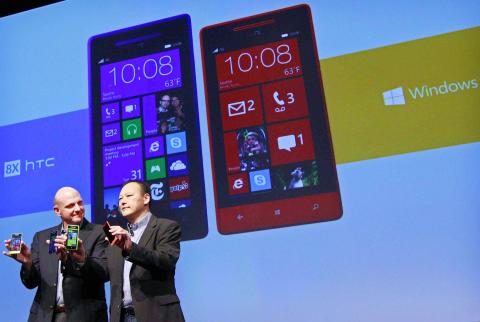Taiwan’s HTC Corp (宏達電) unveiled its first smartphones powered by Microsoft Corp’s Windows 8 on Wednesday, in a boost for the US software giant’s efforts to break into a market dominated by Apple Inc and Google Inc.
HTC and Microsoft previewed the 8X and 8S handsets in New York, boasting that they feature “iconic design,” studio-quality sound and “incredible camera capabilities.”
The companies said the HTC sets would be available from November in at least 50 countries

Photo: Reuters
“We’ve been inspired by Windows Phone 8 to create new smartphones that give the platform the iconic design and personality it deserves,” HTC chief executive Peter Chou (周永明) said. “Windows Phone has clearly emerged as one of the top mobile ecosystems and is competitive against any other smartphone platform in the world.”
The news comes two weeks after Finland-based Nokia Oyj unveiled its smartphones powered by Windows Phone 8, Microsoft’s upgraded mobile operating system that aims to compete with Apple’s iOS used on the iPhone and a multitude of Google Android handsets.
“Pairing HTC’s beautiful new Windows Phone 8X and 8S with our brand is a big milestone for both companies,” Microsoft chief executive Steve Ballmer said. “Together we are offering customers a clear choice and a truly unique experience. I’m thrilled to take our longstanding partnership to the next level.”
The smartphones will feature an ultra-wide-angle front-facing camera that allows four or more people to be captured in one shot, and also allows for high-definition video capture.
HTC said its Beats Audio “provides authentic, studio-quality sound that delivers the spirit of the original recording.”
The phones will have displays matching or exceeding that of the new iPhone 5, and will use the newest version of Corning’s lightweight Gorilla Glass.

With an approval rating of just two percent, Peruvian President Dina Boluarte might be the world’s most unpopular leader, according to pollsters. Protests greeted her rise to power 29 months ago, and have marked her entire term — joined by assorted scandals, investigations, controversies and a surge in gang violence. The 63-year-old is the target of a dozen probes, including for her alleged failure to declare gifts of luxury jewels and watches, a scandal inevitably dubbed “Rolexgate.” She is also under the microscope for a two-week undeclared absence for nose surgery — which she insists was medical, not cosmetic — and is

CAUTIOUS RECOVERY: While the manufacturing sector returned to growth amid the US-China trade truce, firms remain wary as uncertainty clouds the outlook, the CIER said The local manufacturing sector returned to expansion last month, as the official purchasing managers’ index (PMI) rose 2.1 points to 51.0, driven by a temporary easing in US-China trade tensions, the Chung-Hua Institution for Economic Research (CIER, 中華經濟研究院) said yesterday. The PMI gauges the health of the manufacturing industry, with readings above 50 indicating expansion and those below 50 signaling contraction. “Firms are not as pessimistic as they were in April, but they remain far from optimistic,” CIER president Lien Hsien-ming (連賢明) said at a news conference. The full impact of US tariff decisions is unlikely to become clear until later this month

GROWING CONCERN: Some senior Trump administration officials opposed the UAE expansion over fears that another TSMC project could jeopardize its US investment Taiwan Semiconductor Manufacturing Co (TSMC, 台積電) is evaluating building an advanced production facility in the United Arab Emirates (UAE) and has discussed the possibility with officials in US President Donald Trump’s administration, people familiar with the matter said, in a potentially major bet on the Middle East that would only come to fruition with Washington’s approval. The company has had multiple meetings in the past few months with US Special Envoy to the Middle East Steve Witkoff and officials from MGX, an influential investment vehicle overseen by the UAE president’s brother, the people said. The conversations are a continuation of talks that

CHIP DUTIES: TSMC said it voiced its concerns to Washington about tariffs, telling the US commerce department that it wants ‘fair treatment’ to protect its competitiveness Taiwan Semiconductor Manufacturing Co (TSMC, 台積電) yesterday reiterated robust business prospects for this year as strong artificial intelligence (AI) chip demand from Nvidia Corp and other customers would absorb the impacts of US tariffs. “The impact of tariffs would be indirect, as the custom tax is the importers’ responsibility, not the exporters,” TSMC chairman and chief executive officer C.C. Wei (魏哲家) said at the chipmaker’s annual shareholders’ meeting in Hsinchu City. TSMC’s business could be affected if people become reluctant to buy electronics due to inflated prices, Wei said. In addition, the chipmaker has voiced its concern to the US Department of Commerce